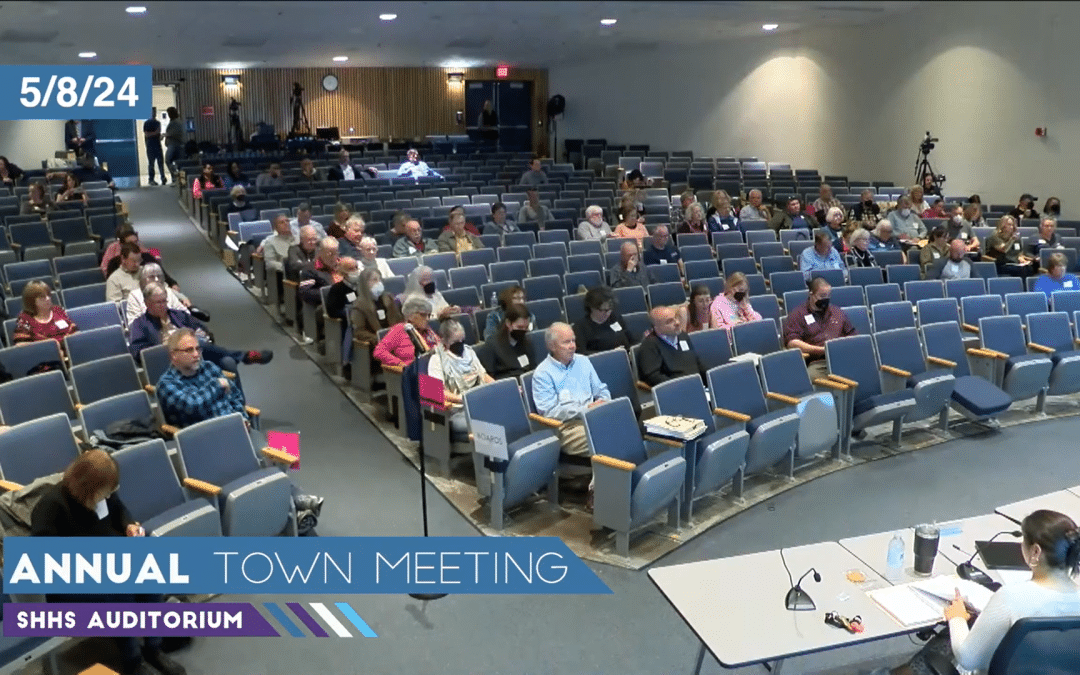Town Meeting members listen to one of the articles get explained on May 8.
Reminder Publishing screen capture by Tyler Garnet
SOUTH HADLEY — Town Meeting members gathered on May 8 to vote on special and annual Town Meeting articles. Between the two meetings there were 32 articles approved, with one being tabled and another was agreed to not be voted on.
Article 14 was to see if the town will transfer from Landfill Retained Earnings and Enterprise Fund Receipts the sum of $750,000 to buy trash and recycling carts.
Over the past couple of months, South Hadley has been considering new options for a new cart-based trash system that includes three standard sizes of carts for each household.
The plan is still being developed and the town is deciding whether to lease or buy the carts and residents will still sue the current green bag system that includes manual pickup next fiscal year while the DPW purchases and assembles approximately 13,2000 trash and recycling carts.
The Select Board and Capital Planning Committee both agreed to defer action on the article so there was no motion.
Article 24 a nuisance bylaw amendment that dealt with unreasonable noise, property maintenance, discarded furniture and the enforcement of all three. It was tabled to next Town Meeting after a lengthy conversation.
The Board of Health and Conservation Commission looked to eliminate section 179.4 of the town’s bylaws, stating that all property owners will be responsible to keep their property in a reasonable state of repair. Grass will be kept no higher than 6 inches; leaves, excessive grass clippings will be removed, composted or otherwise properly disposed of; damaged branches will be addressed; and other debris or litter will be eliminated from the property.
Town Administrator Lisa Wong said those groups and the town realized that was not something they could enforce and there is a push to support pollinating yards by not dictating the height of residents’ grass.
The rest of the sections in the article were put forward by the Selectboard. It included producing a measurable decibel level for unreasonable noise and setting fines for any person who violates the noise levels.
Restrictions do not apply to emergency vehicles, highway, utility maintenance and construction, snow removal or street cleaning, the reasonable use of amplifiers or loudspeakers for public addresses, noise caused by agricultural, farm-related activities, noise caused by lawful hunting or other lawful discharge of firearms, noise from activities that have been duly authorized by the Selectboard and organized sporting events.
Fines were also set for residents who have discarded furniture, mattresses, building material, appliances, electronic equipment or other surplus home goods left on the curb or tree belt that were not allowed or approved by the DPW for pickup.
Multiple amendments were put forward by the Town Meeting members during the discussion including striking the section that any source of sound that increases the broadband sound level by more than 10 dB(A) above ambient; or produces a “pure tone” condition when any octave band center frequency sound pressure level exceeds the two adjacent center frequency sound pressure levels by 3 decibels, or more is unreasonable noise.
Town Meeting members agreed to table the article as they wanted a more concise article that narrows down the possible complaints and is refined based on the conversation at Town Meeting.
All the other articles were approved including Article 16 which appropriated $2.07 million for the purpose of paying costs of a feasibility study for the Mosier Elementary School.
$1.47 million is from the Mosier Stabilization Fund and $600,000 from is from free cash.
Wong said that over four previous Town Meetings, four separate allocations have been approved into the Mosier Elementary School Stabilization Fund which was set up for funding the feasibility study.
“We were invited very recently to enter the process and thus as part of this, we have to complete a six month eligibility period in which there are a number of steps. Included in that is to create a fund for the feasibility study,” Wong added.
The previous funds will sit in an account and can be used to begin the process of hiring and being able to conduct the feasibility study including ‘a public process,’ according to Wong.
Town Meeting also approved disabling the Opioid Stabilization Fund and transfer the funds to a special fund.
Last year, Town Meeting voted to approve the Opioid Stabilization Fund and since then the state has passed a law that will allow the town to receive and spend funds more efficiently.
The funds must be spent under the same guidelines but will not require a Town Meeting vote every time they are used and can come in front of the Selectboard instead.
The full results of Town Meeting can be found at www.southhadley.org.


